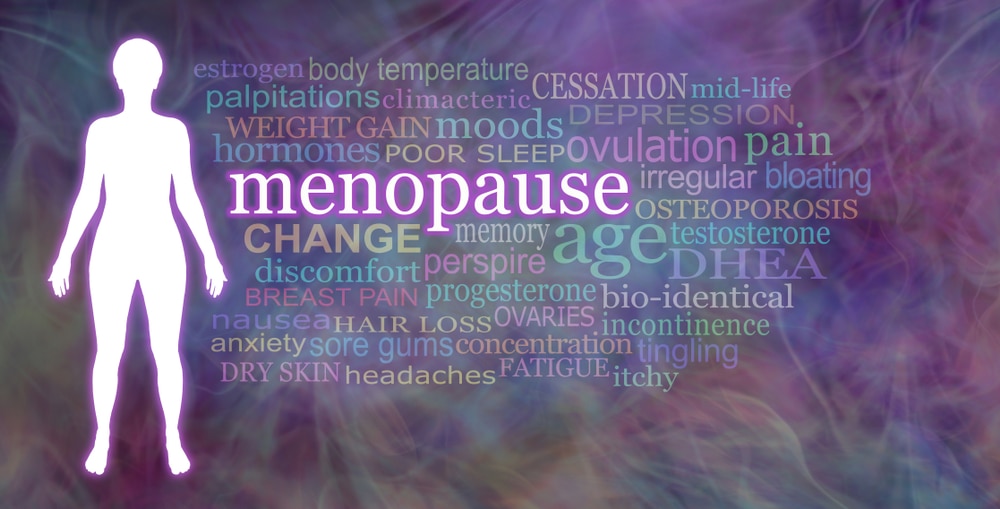Menopause is a natural transition that many women go through as they age. It can bring about physical and emotional changes, including sleep disturbances such as insomnia and sleep apnea due to sleep fragmentation which has been linked to weight gain.
Both of these health issues can lead to serious health consequences if left untreated.
Studies have shown that between 25% and 80% of menopausal women suffer from sleep problems associated with menopause. Insomnia can occur when hormones are out of balance or when menopausal symptoms such as hot flashes and night sweats disturb sleep.
Hot Flashes

Hot flashes begin in the face before spreading to the chest and the rest of the body. They can last as short as 30 seconds or as long as five minutes. Hot flashes affect 75 to 85 percent of women around menopause, so it is important to take steps to manage them properly.
Night Sweats
Night sweats are another menopausal symptom that is often experienced with hot flashes. They involve excessive sweating during sleep and can cause menopausal women to wake up through the night feeling uncomfortable and drenched in sweat.
In addition, menopausal weight gain is a common problem that can cause sleep disturbances due to an increased risk of developing obstructive sleep apnea.
Obstructive Sleep Apnea
Obstructive sleep apnea is a type of sleep-related breathing disorder that happens when the muscles in the throat relax too much during sleep and block the airways. This can lead to snoring, choking, or gasping for air, as well as other health problems such as obesity and high blood pressure.
Studies have found that menopausal women are at greater risk for developing obstructive sleep apnea than men or premenopausal women. The extra weight around the neck caused by menopause-related weight gain increases this risk, making it important for menopausal women to try to maintain their ideal body weight.
Treatment Tips
The good news is that menopausal women can take steps to manage their sleep problems and prevent weight gain. Limiting caffeine and alcohol intake, exercising regularly, and establishing a regular sleep schedule are all important lifestyle changes that can help menopausal women maintain healthy sleeping habits.
Additionally, menopausal women should talk to their doctor about any symptoms or health concerns they may have regarding menopause-related sleep issues.
Caffeine
Limiting caffeine can be a great way to improve menopausal sleep disturbances and prevent long-term health risks. Caffeine is a stimulant found in coffee, tea, energy drinks, chocolate, and other foods and beverages.
While research shows that drinking caffeine in moderation can be beneficial for menopausal women – such as boosting alertness and improving memory – it can also disrupt natural sleep cycles if consumed too close to bedtime.
To reduce the risk of menopausal-related sleep problems, menopausal women should limit their caffeine intake to no more than 200 milligrams per day (the amount typically found in one cup of brewed coffee).
When possible, menopausal women should try to avoid consuming any caffeine after lunchtime.
Alcohol
Menopausal women should limit their alcohol intake, as alcohol can interfere with menopausal sleep patterns. Alcohol reduces the amount of time needed to fall asleep, but it also decreases the quality of sleep later in the night.
For menopausal women, drinking too much alcohol can cause them to wake up more often during the night and feel restless throughout the day.
Exercising Regularly

Exercising regularly is another important lifestyle change menopausal women should consider to improve menopausal sleep disturbances and reduce weight gain.
Exercise helps regulate hormones and increases natural endorphin levels, which can help menopausal women manage hot flashes and other menopause-related symptoms.
Additionally, exercising regularly can help menopausal women maintain a healthy weight and reduce their risk of developing menopause-related sleep issues.
Establishing a Regular Sleep Schedule
Having consistent sleeping and waking times is another important lifestyle change menopausal women should consider to improve menopausal sleep disturbances.
Establishing a regular sleep schedule helps menopausal women better regulate their body clocks, so their bodies know when it’s time to go to bed and wake up in the morning. Additionally, menopausal women should try to limit naps during the day, as well as any activities that can lead to insomnia, such as watching television or using electronics late at night.
By taking these steps to limit caffeine and alcohol intake, exercising regularly, and establishing a regular sleep schedule, menopausal women can improve menopausal sleep disturbances and reduce their risk of developing long-term health problems.
Though menopause brings with it many challenges, menopausal women should talk to their doctor about any concerns they may have regarding menopause-related sleep issues so that they can best manage these changes and lead a healthy life.
Why Weight Gain in Menopause
Menopause is often associated with an increase in weight gain. Unfortunately, the average woman accumulates roughly 15 extra pounds during this transition—which can be attributed to a decrease in physical activity and heightened food intake.
While some of these changes are due to hormonal fluctuations or metabolic shifts, we all need to recognize that our lifestyle choices have a direct impact on how much we weigh.
Menopause can be a difficult time for any individual, especially when it comes to health and weight.
Symptoms associated with menopause include:
- Hot flashes
- Night sweats
- Irregular periods
- Headaches
- Mood swings
- Sleep disturbances
- Weight gain
- Vaginal dryness
Menopause can come with a range of physical changes, such as thinning hair on the head and increased facial hair growth. Although this process may bring symptoms like fatigue or mood swings due to hormone fluctuations, there are also positives to look forward to – notably enhanced mental clarity from stabilized hormones.
Excess body fat around the abdomen increases one’s vulnerability to issues like breathing difficulties, cardiovascular diseases, and type 2 diabetes.
Furthermore, excess body mass can increase the risk of developing breast cancer, colon cancer, or endometrial cancers – all serious conditions that may result in disability or premature death.
Therefore it is essential to take proactive steps toward maintaining a healthy weight during menopausal transitions.
Metabolic Syndrome
As women transition through menopause, they are more susceptible to metabolic syndrome – a medical condition consisting of symptoms that could lead to type 2 diabetes and heart disease. This is due to the inherent hormonal alterations that occur during this period of their lives.
Metabolic Syndrome is a prevalent health concern that can be recognized if you meet any three of the five criteria outlined below: an abdominal circumference greater than 35 inches, triglycerides over 150 mg/dL, HDL cholesterol under 50mg/dL, blood pressure higher than 130/85 mmHg and Fasting Blood Sugar (FBS) above 126mg/dl.
People who have Metabolic Syndrome are prone to developing chronic complications like sleep apnea, heart disease, or stroke – in addition to diabetes.
This emergence should not go disregarded as early detection can ensure timely management while reducing the severity of any further adverse effects on your health.
Many factors can contribute to the development of metabolic syndrome, including body mass, obesity, high blood pressure, Insomnia, and adverse lipid profiles.
The metabolic changes include decreases in the levels of estrogen and progesterone, which can lead to weight gain, increases in body fat, and make it difficult to lose weight during menopause. Additionally, menopause can lead to increases in blood pressure and insulin resistance.
Hormonal Changes
During menopause, a woman’s estrogen levels decrease significantly. Estrogen helps regulate body fat distribution, so lower estrogen levels can lead to increased fat storage in the abdominal area leading to weight gain.
Women may have an increase in cortisol levels (the “stress hormone”), which can lead to stress eating.
Women may also experience an increase in appetite as a result of menopause, leading to an increased calorie intake and further weight gain.
To fight menopausal weight gain, women should focus on maintaining a healthy lifestyle including regular physical activity and a healthy diet. Eating less processed foods, limiting sugar intake, and increasing dietary fiber can help prevent
Medical Management Options
There are several options for menopausal women who need medical management of menopause-related weight gain and metabolic syndrome.
These include hormone therapy (replacement of lost hormones) and medications to help reduce cholesterol levels, blood pressure, or insulin resistance.
Menopausal women must talk with their doctor about the most appropriate treatment plan.
Lifestyle Factors
Menopausal women should be aware of lifestyle factors that can contribute to menopause-related weight gains, such as inadequate sleep, lack of physical activity, and poor dietary choices.
Research shows that menopausal women who are not physically active are more likely to experience menopause-related weight gain than those who are regularly active.
Additionally, menopausal women should pay attention to what they eat – eating a healthy diet consisting of whole grains, lean proteins, fruits, and vegetables and avoiding processed foods will help menopausal women avoid excess pounds.
Medical Conditions
Finally, menopausal women should be aware that medical conditions can also contribute to menopause-related weight gain. For example, thyroid disorders or diabetes can lead to increased fat storage and menopause-related weight gain.
Menopausal women taking certain medications such as steroids or antidepressants can experience menopause-related weight gain due to medication side effects.
Maintaining a healthy weight is an essential part of health, especially during menopause. Too much body fat around the abdomen can lead to breathing problems, cardiovascular diseases such as heart attacks and strokes, type 2 diabetes, and even certain types of cancer like breast cancer or endometrial cancer. All of these issues can be very serious; thus steps must be taken to manage body weight while going through this transitory period in life.
Insomnia and Menopause
Insomnia and menopause often go hand in hand. Menopausal women may struggle to get a good night’s sleep due to hot flashes, night sweats, and other menopausal symptoms. Hormonal fluctuations can also disrupt the body’s circadian rhythm, making it difficult for menopausal women to find restful sleep.
Excessive Daytime Sleepiness
The combination of menopausal symptoms and insomnia can lead to excessive daytime sleepiness, which can cause menopausal women to feel tired and lethargic during the day. This can make it difficult to complete normal daily activities like work or school.
Additionally, menopausal women who lack energy due to not getting enough high quality sleep are less likely to participate in physical activity than those who do get enough sleep.
Managing Sleep Disorders During Menopause
Fortunately, menopausal women can take steps in order to manage the sleep disturbances caused by menopause. Limiting caffeine and alcohol, staying physically active regularly, as well as committing to a consistent nightly routine will help improve the quality of slumber for those going through this stage in life. In addition, relaxation practices such as deep breathing or progressive muscle relaxation are great ways for them to reduce their symptoms related to menopause.
Conclusion
During menopause, a woman’s body goes through considerable changes that can include mood swings, weight gain, and sleep disturbances. To tackle these issues more effectively, women should strive to make healthier lifestyle choices such as reducing the amount of caffeine they consume and making sure to engage in regular physical activity. Doing so will not only help control possible menopausal weight gains but also improve their sleep quality.
Additionally, menopausal women should be aware of any medical issues that could potentially cause weight gain during this time and seek support from a healthcare provider if necessary. With the right guidance, they can achieve restful sleep and maintain a healthy body weight.





